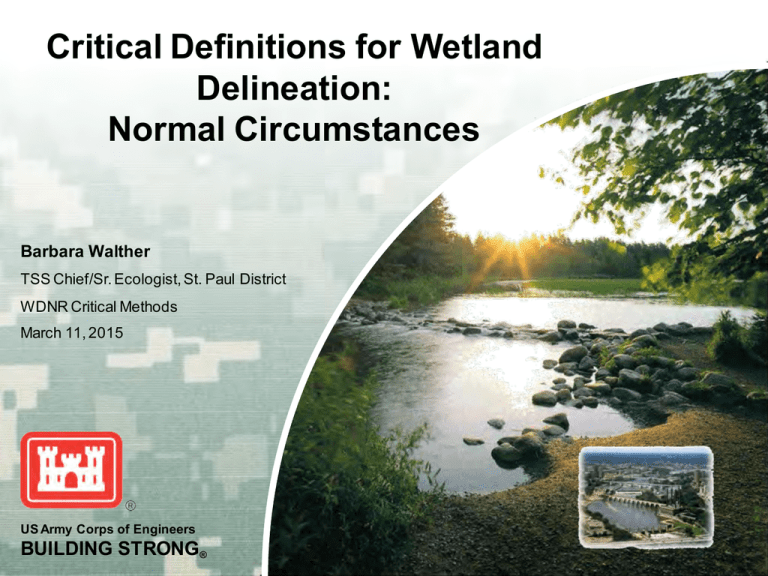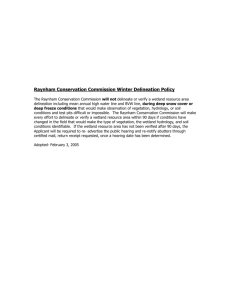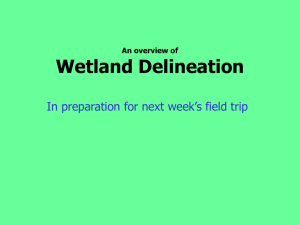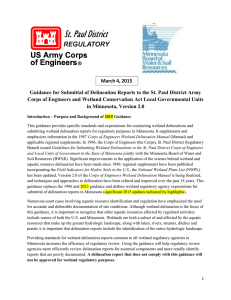Normal Circumstances - UW
advertisement

Critical Definitions for Wetland Delineation: Normal Circumstances Barbara Walther TSS Chief/Sr. Ecologist, St. Paul District WDNR Critical Methods March 11, 2015 US Army Corps of Engineers BUILDING STRONG® What is a Wetland? Technical definition: Those areas that are inundated or saturated by surface or ground water at a frequency and duration sufficient to support, and that under normal circumstances do support, a prevalence of vegetation typically adapted for life in saturated soil conditions. Answer the Question If yes, data collection is based on current conditions. If no, data collection is based on conditions that would exist in absence of disturbance. NEC vs. NC Normal Environmental Conditions? Normal circumstances? Normal Circumstances The long-term or stable condition of a site including any authorized or other legal alterations, such as highways, dams, and other relatively permanent infrastructure and development. The conditions indicated by the soils and hydrology normally present on a site, in cases where the vegetation has been altered or removed. The conditions that would exist on a site in the absence of any active and discretionary manipulation of hydrology. Normal Circumstances A new, legal alteration that is relatively permanent can establish a new normal circumstance (e.g., concrete dam, authorized wetland fill, ditch) Ditch constructed in 1950s and maintained since = ditch is established as the normal circumstance; partially drained is the normal circumstance for hydrology Ditch constructed last year = ? 1987 Manual: Mere presence of artificial drainage system does not necessarily mean wetland hydrology has been eliminated Normal Circumstances Recent, unauthorized fill that buried native soils and altered hydrology is not the normal circumstance Normal Circumstances Regular cropping of an agricultural field is NOT the normal circumstance. Normal circumstances can exist in an agricultural field. Determine the soils and hydrology driving the site. Applying the “Mapping Conventions” will help determine ‘normal’ hydrology in agricultural settings. Normal Circumstances 1. Alterations that occurred before implementation of the Clean Water Act. 2. Alterations that were authorized, exempt, or did not require authorization. 3. Hydrologic modifications, such as functioning ditches or subsurface drains, that were installed legally, are relatively permanent, are maintained, and operate by gravity without any artificial input of energy or manpower. 4. Ongoing hydrologic manipulation that is permanent and nondiscretionary, such as pumping of surface or groundwater for municipal water supply, done under a court order, or required for public safety. 5. A site with undisturbed conditions, including those wetlands identified as problem areas NOT normal circumstances 1. Unauthorized or illegal activities or activities done with the intent of evading Clean Water Act jurisdiction. 2. Total or partial clearing of vegetation, or selective removal of plant species (i.e., managed plant community). 3. The presence of a crop, tree farm, improved pasture, other planted vegetation, or cultivars (i.e., managed plant community). 4. Destruction of hydric soil indicators by cultivation or mixing of soil layers. 5. Irrigation. 6. Discretionary pumping of surface or groundwater, such as pumping for agricultural purposes. 7. Active and discretionary manipulation of water tables, such as subirrigation and other active water-table management for crop production or management of soil moisture and nutrients. What is a Wetland? Technical definition: Those areas that are inundated or saturated by surface or ground water at a frequency and duration sufficient to support, and that under normal circumstances do support, a prevalence of vegetation typically adapted for life in saturated soil conditions. Difficult Wetland Situations Disturbed/Atypical Situations: ► One or more parameters absent due to recent human activity or natural event Unauthorized activities Natural events Man-induced wetlands Checking the Boxes ? NO Recently discharged fill material. Date of discharge reported as 4/12/14. ? NO Areas affected by grazing ? Area is regularly grazed by livestock. YES Areas affected by grazing NO Area is regularly overgrazed by livestock. NO Area is currently a golf course; regular irrigation and turf management (not NC); hydrology and soils disturbed years ago for construction (NC). Difficult Wetland Situations Problem Areas: ► One or more parameters absent due to normal seasonal or annual variability, or permanently due to the nature of the soils or plant species Seasonal wetlands Prairie potholes Floodplain wetlands Interdunal swales July 15, 2013 YES YES The area is a wicked big puddle and it’s July, so it’s wicked dry. NO YES The site is a prairie pothole wetland following a 3-year drought. 22 YES The site is a floodplain, with alluvial soils and seasonal hydrology. ? NO © Steve D. Eggers Agricultural field where vegetation has been removed and soils bulldozed. YES Normal Circumstances The conditions that would exist if humans hadn’t screwed with them. Determine if one or more parameters is MISSING or OBSCURED due to disturbance.



